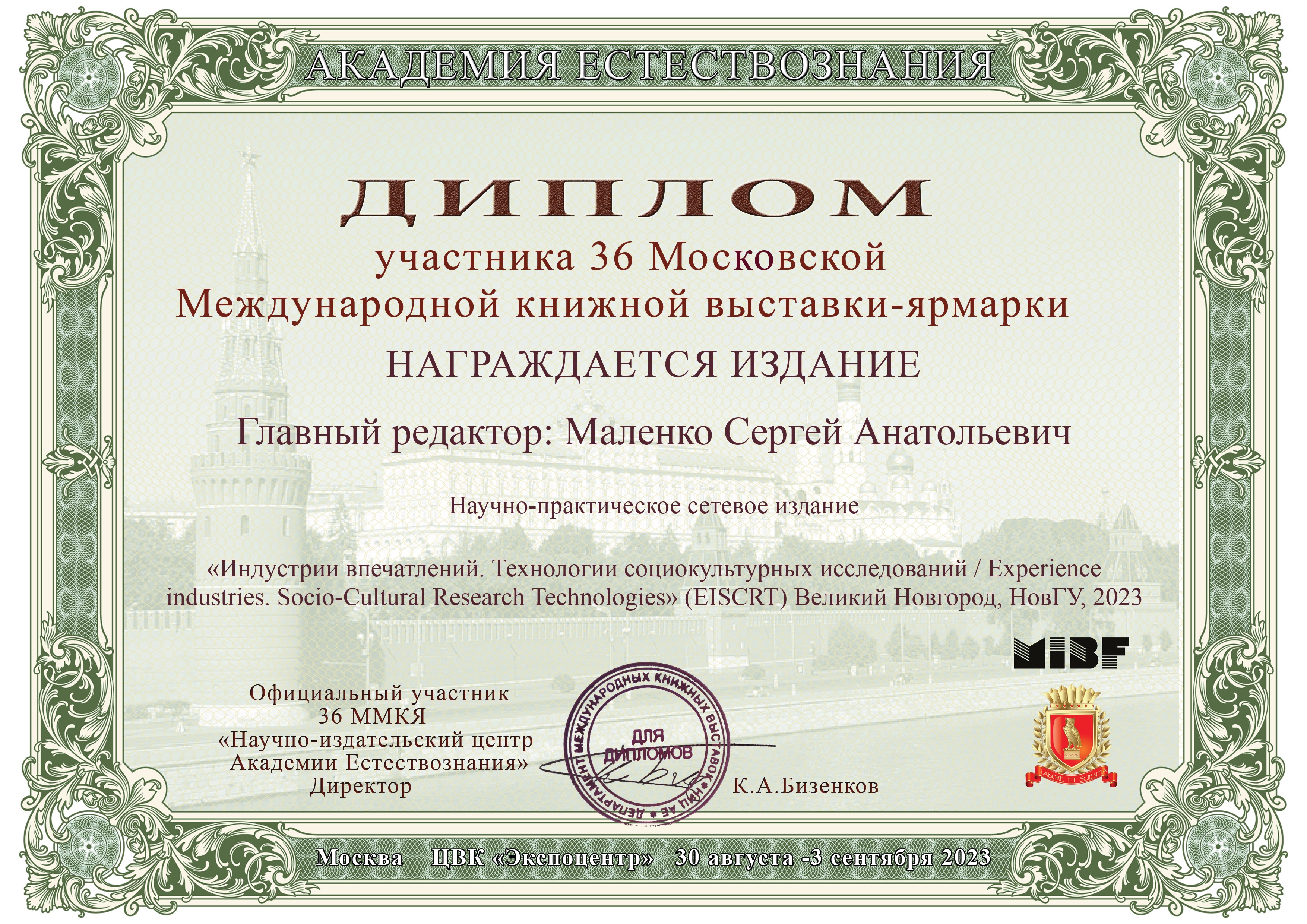EXPERIENCE INDUSTRIES IN SEARCH OF KEYS TO THE SECRETS OF AUDIENCE PERCEPTION
DOI:
https://doi.org/10.34680/EISCRT-2025-2(11)-9-17Abstract
Dear readers!
The second issue of the scientific and practical online publication “Experience Industries. Socio-Cultural Research Technologies” (EISCRT) in 2025 focused on examining approaches to the problem of forming the perception of the viewing audience that exist in various spheres of modern culture, but, at the same time, are maximally consistent with specific artistic material.
The issue opens with a study by Nizhny Novgorod authors Elizaveta Pakhomova and Artem Fomenkov. The article is devoted to the analysis of the techniques of using feature films in the educational process of a modern university. Documentary and arthouse cinema is undoubtedly characterized by a high degree of imagery and persuasiveness precisely due to the visualization of significant ideas and meanings, without which the process of training modern humanities students is simply unthinkable. Despite this, the modern youth audience, unfortunately, is characterized by an extremely low degree of erudition in the field of cinematography, which, at the same time, creates considerable additional educational potential.
Elena Semenova, Director of the Non-Commercial Partnership "Theatre-EX" from Moscow, reflects on the identity crisis of actors in contemporary street theatre. On the one hand, such a crisis is caused by the professional activities of its participants, and on the other, it is connected with persistent attempts to distance themselves from it. Such a situation inevitably and naturally gives rise to a laughing reflection of street theatre actors who persistently strive to turn the place of their creativity into an informal institution for the destigmatization of theatrical art.
The traditional column "A Matter of Taste: connoisseur’s impressions", hosted by Oleg Shevchenko, this time invites the reader to delve into the centuries-old secrets of the traditions of mythologization of wine images in world culture. The author carefully studied Sumerian, Hittite and Ancient Egyptian mythologies in order to clarify the origins of the formation and features of the transformation of those sublime states and artistic images directly related to the production and consumption of wine. He discovers that these processes gradually cease to be sacred rituals and naturally turn into everyday secular actions, inevitably descending into the spectrum of alcoholic deviations.
The "Horizons" section became key for this issue, as it has a special thematic value.
Novgorod researchers Sergey Malenko and Andrey Nekita analyze the post-apocalyptic model of social organization presented in the film "Snowpiercer" (2013). The popularity of this film is largely due to the ability of the creative team of the project to establish the most striking direct parallels between fictional tragic situations of the near future of humanity and the most acute social problems of modern society, immersed in the abyss of various kinds of largely man-made cataclysms.
Professor from the Tyumen Institute of Culture Alexey Ushakov shares his own experience of organizing work with inclusive viewers in the space of immersive 4D theater. Thanks to immersive technologies, inclusive viewers come closer to ordinary people, which naturally creates a special theatrical atmosphere and forms a specific technology for immersing such viewers in the space of deep stage meanings.
Rostov researcher Ekaterina Shapovalova suggests lifting the curtain on technologies for working with the Internet audience. The subject of her scientific interest is Internet memes, which specifically reflect the cultural identity of modern Russian cities. Local meme culture directly reflects key social problems of regional communities, and in an ironic and satirical form allows us to rethink the specifics of the transformation of the cultural identity of residents of urban spaces in Russia.
Tatyana Shmeleva from Veliky Novgorod continues the theme of regional studies of meme culture. She focuses on the cult of Friday that has formed in the Internet space. To a greater extent, it has become characteristic of office workers, and such media content itself is a completely special element of modern humorous culture, demonstratively opposed to the cult of labor and the associated heroism of labor.
The issue ends with a research article by Kazan scientist Elena Yakovleva, devoted to the study of the anthropological attitudes of the electronic nomad, into which the ordinary user of instant messengers and social networks is turning today. The magical appeal of these electronic communication channels is provided by an existential performance in which the electronic nomad simultaneously acts as a playwright, director and actor.
The creative team of the scientific and practical online publication sincerely hopes that the research presented in this issue will definitely find its interested readers and will become an excellent reason for future fascinating scientific discussions, which will result in further impressive materials.








